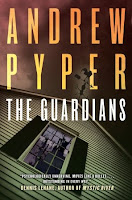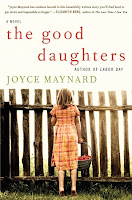 A friend at Doubleday sent me a galley for Andrew Pyper’s The Guardians way back in the way back, and then asked that I not post until closer to the book’s pub date, which was the beginning of the month, I think. Regardless, I put the book on my shelf and forgot about it until one day last week when I was searching around for something BETTER to read than the Joyce Maynard I had just finished. I described the book on Twitter as such: “The Guardians = Stand By Me + River’s Edge / Mystic River without the Boston setting.”
A friend at Doubleday sent me a galley for Andrew Pyper’s The Guardians way back in the way back, and then asked that I not post until closer to the book’s pub date, which was the beginning of the month, I think. Regardless, I put the book on my shelf and forgot about it until one day last week when I was searching around for something BETTER to read than the Joyce Maynard I had just finished. I described the book on Twitter as such: “The Guardians = Stand By Me + River’s Edge / Mystic River without the Boston setting.”
And I stand by these comps. The book, about a group of hockey-playing young men, friends since grade school, who end up embroiled in a tragic situation involving their hockey coach, a young woman and a haunted house, was seriously not what I expected. As you know, I have little faith in “haunted” stories. Blame my reticence on Sarah Waters, I think The Little Stranger ruined it for me forever, and maybe it’s because I don’t think any book can do “haunting” better than that Alejandro Amenábar film, The Others, I’ve given up finding satisfaction in being scared in print. Also, I really hate being scared so why would I put myself through days of it versus 1.5 hours of a film.
Yet, I found myself inexplicably drawn into to Pyper’s narrative. He has a cool way with character, they’re masculine, very Lehane-esque, but that’s not off putting to me as a female reader. The main character, Trevor, suffers from Parkinson’s, which, while the disease isn’t remotely the same as mine, I can kind of relate to — simply the idea of your body not cooperating with itself. When his childhood friend commits suicide after years of protecting both the secret the group of four boys harbours and the house across the street (the haunted house), Trevor and Randy (the second of the foursome) head home for the funeral. The truth unravels from there, and I didn’t even mind the “memory diary” device that Pyper uses (Trevor’s therapist insists he keep it as a way of dealing with the disease; should my shrink ever do such a thing I would terminate treatment immediately; who wants to be constantly reminded of what the farking disease has taken away from you, seriously?). The narrative switches back and forth between Trevor’s diary and the action in the present tense.
There are all kinds of interesting things that happen when someone goes home, especially someone who made the conscious choice, after the tragedy, that Trevor did to never go back. The small-town Ontario setting adds to the nuance of the novel — things like this couldn’t happen in a big city, someone would tear the house down, raze the trouble before it even started or simply not notice, walk on by. But in this town, a hockey town, the house stands for over forty (I think) years creating havoc for not only the four boys who are deliciously intertwined in its grasp, but a few other tragic souls as well. It’s a terrific book, a perfect read for a snow day if there ever was one, and I’m glad that I read it in the deep, deep hours of the night, just for those extra chills.
The other title I read last week was Jessica Grant’s Making Light of Tragedy for my book club. The cover sucks so I am refusing to put it up here on the blog, and Kerry’s done a wonderful job of wrapping up our meeting. Everything she says about the book, well, that’s what I think about the book too. I fell on the Grant’s writing was a little bit too twee for my liking, and kept thinking of that old-school writing class line that if you’re in love with your prose that’s the stuff that should be cut right away, and there were many, many, many loved lines in these stories that could have been sliced to the benefit of the writing. However, there were also some amazing metaphors — and this coming from a girl who actively removes every single metaphor from her own writing she finds them so distracting — where I found my breath catching just a bit at her turn of phrase it was so beautiful. So, uneven, but enjoyable. The company, however, and our meeting, was a serious breath of fresh air. I even managed to feel like I was using a part of my brain that a) doesn’t sing everything I’m doing, b) actually considers thoughts before they come out of my mouth, and c) had nothing to do with talking to or about the RRBB.
WHAT’S UP NEXT: I’m reading The Keep right now, as recommended by a few friends, but am actually spending far too much time playing iPad Scrabble during the late-night feedings. It’s scrambling my brain a little so I am going to stick to just the book tonight, we’ll see how that goes at 2 AM.





